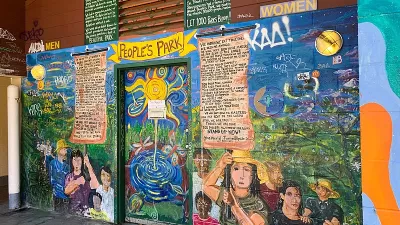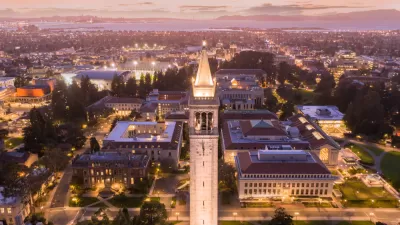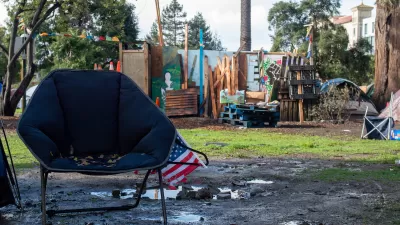The University of California, Berkeley faced bitter opposition to new student housing. What does this mean for universities—and for democracy?

In an op-ed for MinnPost republished in Next City, Zak Yudhishthu outlines what the city of Berkeley could learn from its contentious fight over student housing in People’s Park.
“Residents of the city wanted to see UC Berkeley reduce its admission size, arguing that the students were an environmental nuisance which the city did not have room to house.” While the university won out in this case, a state court ruling means future students will be considered an environmental impact due to potential noise.
Yudhishthu compares the situation to St. Paul, where a similar debate over student housing happened in the 2000s and again in 2012. For Yudhishthu, “In an immediate sense, the refusal to let our higher education systems grow is a destructive tendency. When colleges can’t grow, the students of tomorrow face a world with less choice and greater competition for existing slots.”
Yudhishthu points out that opposition to student housing often goes hand in hand with other exclusionary policies such as single-family zoning. “This is no healthy way to cohabitate in our cities and towns. Successful communities shouldn’t be defined by keeping people out, but by welcoming newcomers and incorporating them into civic life.”
FULL STORY: What Berkeley Can Learn From This Historic Fight Over Student Housing

Maui's Vacation Rental Debate Turns Ugly
Verbal attacks, misinformation campaigns and fistfights plague a high-stakes debate to convert thousands of vacation rentals into long-term housing.

Planetizen Federal Action Tracker
A weekly monitor of how Trump’s orders and actions are impacting planners and planning in America.

In Urban Planning, AI Prompting Could be the New Design Thinking
Creativity has long been key to great urban design. What if we see AI as our new creative partner?

How Trump's HUD Budget Proposal Would Harm Homelessness Response
Experts say the change to the HUD budget would make it more difficult to identify people who are homeless and connect them with services, and to prevent homelessness.

The Vast Potential of the Right-of-Way
One writer argues that the space between two building faces is the most important element of the built environment.

Florida Seniors Face Rising Homelessness Risk
High housing costs are pushing more seniors, many of them on a fixed income, into homelessness.
Urban Design for Planners 1: Software Tools
This six-course series explores essential urban design concepts using open source software and equips planners with the tools they need to participate fully in the urban design process.
Planning for Universal Design
Learn the tools for implementing Universal Design in planning regulations.
Gallatin County Department of Planning & Community Development
Heyer Gruel & Associates PA
JM Goldson LLC
City of Camden Redevelopment Agency
City of Astoria
Transportation Research & Education Center (TREC) at Portland State University
Jefferson Parish Government
Camden Redevelopment Agency
City of Claremont





























